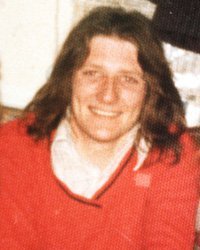#Sands had been voted in as the MP for Fermanagh and South Tyrone at a by election just a month before his death
Explore tagged Tumblr posts
Text

On April 10th 1981, BBC news reported that ‘imprisoned IRA hunger striker’ Bobby Sands had been elected to the House of Commons as MP for Fermanagh and South Tyrone, defeating the Ulster Unionist candidate by a margin of 1446 votes. The path to victory was cleared by the withdrawal of the moderate Catholic Social Democratic and Labour Party, so as not to split the nationalist vote.
Bobby Sands, who was four years into a 14 year sentence on firearms offences, stood for parliament on an Anti H-Block platform, referring to the division of Maze Prison holding those convicted of sectarian terrorism offences. He was also already 41 days into a hunger strike, initiated in the cause of improving brutally harsh conditions, and for a reclassification of their status to that of political prisoners. (The 'special category' status had been revoked in 1976 by Labour Prime Minister Harold Wilson). According to the BBC, he was already too weak at this point to leave his bed in the prison infirmary.
His election agent, (and subsequent MP for the same constituency) Owen Carron, stated:
“…The Nationalist people have voted against Unionism and against the H Blocks. It is time Britain got out of Ireland and put an end to the torture of this country…”
Bobby Sands died on May 5th, 1981.
The Thatcher Government’s public position was that they might be receptive to some reform of prison conditions, but refused to enter negotiations or grant any concessions while the hunger strike continued. Attempts at mediation were made by Pope John Paul II, the European Human Rights Commission, the Irish Commission for Justice and Peace, and the International Red Cross. By October, 10 of the hunger strikers had died, while five prisoners were saved after their families, supported by the Catholic Church, granted permission for medical authorities to intravenously feed those who had lost consciousness.
After the strike ended, the Government announced some measures toward regime improvements. Despite the public hard-line position, some secret negotiations had been occurring through an MI6 agent, while Jim Prior, Secretary of State for Northern Ireland, drove a more conciliatory approach.
The classification to political prisoner status was one compromise not considered, with Margaret Thatcher famously stating, "Crime is crime is crime. It is not political. It is crime. There can be no question of political status." She also said, "Mr Sands was a convicted criminal. He chose to take his own life. It was a choice that his organisation did not allow to many of their victims."
The Representation of the People Act was also amended, preventing other H-Block prisoners, or any prisoner sentenced to more than one year, standing for parliament.
One hundred thousand mourners attended Bobby Sands' funeral.
(Sources: BBC On This Day. Peter Taylor (BBC): "Bobby Sands: The Hunger Strike that Changed the Course of N Ireland's conflict".
#the troubles#northern ireland#uk politics#social history#working class history#history#margaret thatcher#thatcherism
28 notes
·
View notes